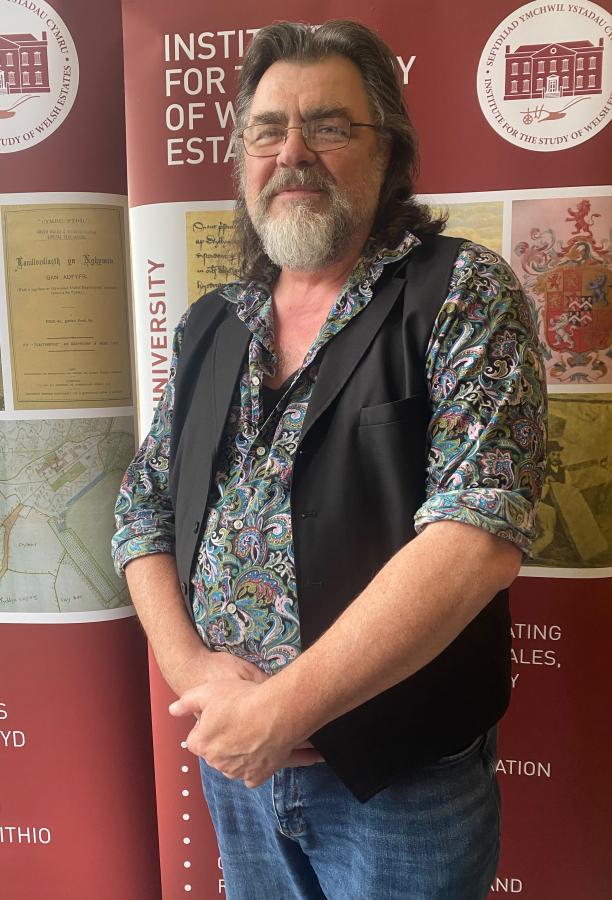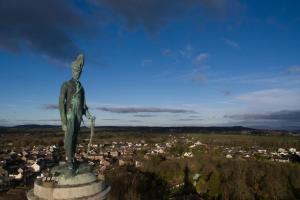Where are you from? Cheshire is my ‘ancestral’ home, born in Nantwich and lived most of my life in Altrincham. However, my ancestry tells a slightly different story with family roots in England, Wales, Ireland, Lithuania, and Scandinavia, but also family connections to Scotland, Europe, The Americas, and New Zealand. For the last eight years beautiful Trearrdur Bay, Ynys Mon/Anglesey has been home and I hope that will continue for a very long time.
What is the subject of your doctoral research project? Its current working title is, Memorials to The Napoleonic Wars: A study and analysis of how and why Britain memorialised its involvement in the Revolutionary and Napoleonic Wars (1792 – 1815). Although as the research is developing, I'm no longer sure it is quite the right title to have… watch this space. I joined ISWE Feb 2021, at the start of my PGR. However, my first contact with ISWE was during my UG years, going to the regular evening lectures. I then completed an UG Internship, via ISWE, on the Anglesey Column in 2019.

What are your main research interests? Social history via investigating material culture, the current topic being public monuments built via public subscription. What do they tell us about the events/people being memorialised and the societies that built them. More broadly I have interests in things such as, Castles, Country Houses (I briefly lived in one), the various Revolutions (Scientific, Agricultural, Industrial, Technological & Political ), social history, transport history chiefly canals, railways but increasingly roads. I also have ad-hoc side projects, e.g., I’ve been researching the catalogues and considering the cultural impact of late 60s and early 70s record labels, such as ‘Harvest’, ‘Island’, ‘Vertigo’, etc. I also research the design, build, and repair of guitars. Sometimes I also dig into the history of Photography.
Tell us about your career so far and what led you to ISWE and your doctoral research project? I have done quite a few ‘other things’, resulting in lots of work/life experience, but gained few meaningful qualifications until recently. In 1967 I attended a Catholic seminary, with the idea of joining a religious teaching order, but found instead the complete absence of religious faith, so, in 1969 I moved back into mainstream education. It didn’t do me any good, as I left school with no qualifications of any sort in 1972. Next, I spent a year at a Technical College which furnished me with 5 O-levels in science subjects, and progressed to study A-levels, in Maths, Physics and Chemistry. Due to illness this extended over three years, but sadly the exam results were poor. While at school and college I also worked at weekends on a market stall.
In 1977, I joined ILFORD Photo, as a research lab assistant working within a team developing new Black & White photographic products. I owe everything to the education & training ILFORD (now Harman Technology) gave me. My first tasks were to sweep floors and clean the labs, 26½ years later I left as one of their designated experts on the design, manufacture and application of photographic products and photography. ILFORD, and my colleagues there, helped me to develop many skills. As a member of their Technical Service team for 15 years I helped design and manufacture many products and travelled the World solving customers technical issues, helping them build their businesses.
In 2006 I started working for ‘The Centre for Modern Optics’, then part of Glyndwr University (NEWI) based at the OpTIC Technium St Asaph. It was a 2 year fixed research contact, supervising the design of a photographic material suitable for recording full colour analogue holograms (3D images). I also ran and maintained the hologram recording labs.
In 2008, I joined View Holographics Ltd (VHL) as their production manager. VHL was a start-up commercial R&D business, designing materials, machines, and processes to make holograms from digital sources. At VHL I designed a nano-particle silver-halide material suitable for recording holograms produced by either analogue or digital means. In 2013, for the work carried out on 3D imaging techniques, the research team was awarded a ‘Technical Oscar’ by the Academic of Motion Pictures, (no; I didn’t get to go to the Hollywood ceremony). Sadly, despite the technical successes the business closed in 2014 due to the lack of sustainable financial backing.
My time at OpTIC and the ‘magic’ of the holograms brought me into regular contact with Glyndwr’s academic staff. Conversations with them gave me the idea of attempting to study for higher qualifications. Around 2013, in conjunction with Bangor University, I worked on a small project to make a hologram of the Great Orme, and there was a project proposed for holograms to be part of the Pontio décor, but it was not completed. I had enjoyed working with the folks from Bangor. This resulted in me applying to become an UG at Bangor to study history, which I started in September 2015. Why History? A lifelong interest in all things historical and a desire to work in an alternative field. Why my current PGR project? That is explained in detail elsewhere.
What is your favourite thing about ISWE and being a doctoral researcher? I just love researching stuff, anything that interests me, being a PGR and part of ISWE gives me some purpose and focus to the things I investigate. What I truly like about ISWE is the wide range of historical subject matter that falls under its remit. I enjoy finding out about the subject interests of my fellow PGRs, and the different approaches they are using to do their research.
What is your proudest achievement since joining ISWE? Writing the internship report for the Anglesey Column Trust, and giving a joint presentation, with Alex Anglesey about his ancestor the 1st Marquess and his testimonial column, to the 2019 Bangor 4 nations conference. Although strictly speaking both were completed just before I officially joined the ISWE PGR group.
What is your favourite historical period and why? I find all history fascinating, but I have discovered my main period of interest lies between, Bosworth and the First World War. If I have to focus it down further it would be the 18th and 19thcenturies, and in recent years I’ve been more interested in matters of the 18th C. My interests have been highly Euro-centric, but I am increasingly expanding my horizons to include a more World view of history.
Your favourite place in Wales? This is just far too difficult to answer. Some favourite places are, Llandudno, Conwy, Aberffraw & Llanddwyn beaches, Trearrdur Bay, Parys Mountain, I also have a soft spot for the Pembrokeshire Coast. All these have special memories for me, but lots of other places too.
Can you recommend any books, TV shows, podcasts, blogs that you have enjoyed recently? I’m enjoying a book for review ‘Lives of a Lancashire Mansion’ by Colin Dickinson, an interesting delve into some social history by using a small Victorian country house as its focus. Recently, re-read Northanger Abbey and Persuasion. For a little fun I’m currently immersed in the World of PG Wodehouse again. In terms of TV shows, Recently ‘Breathtaking’, ‘Only Connect’, ‘Derry Girls’, Mary Beard’s Roman shows. I mostly listen to music (lots of it) rather than podcasts, etc. Recent listening; Ezra Collective, Black Country New Roads, Hozier, Miles Davis, John Coltrane, Charlie Mingus, Dave Brubeck, Chet Baker, Mozart, Beethoven, Richard Thompson, Richard Hawley, Elvis Costello, Rolling Stones, King Crimson, First Aid Kit, 60s British Beat and Rhythm & Blues bands, and many more.
What are your hobbies or favourite extracurricular activities? Have you got any other interesting projects on the go? My Family, my dog, walking when I can. Sport, I can no longer take part, but I am a big fan of Rugby, Cricket and Cycling; I enjoy watching most sports activities. Listening to Music, attempting to play music, learning music, designing & building electric guitars, and guitar maintenance in general. Reading, mostly classic literature. Collecting books, vinyl records and CDs. The history of Technology and Transport particularly photography, canals & railways.
Contact Peter:
hiu65c@bangor.ac.uk

